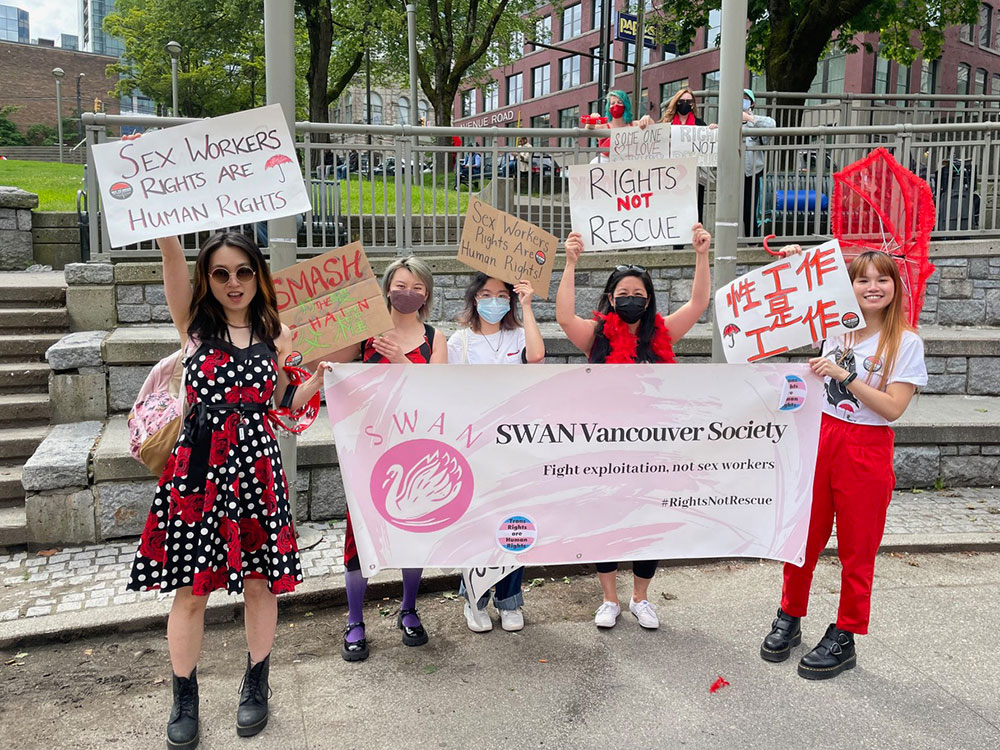Every day, there seems to be more news about human trafficking in Canada. But does this mean that there is more trafficking happening now than there was before? Does it mean that people are finally paying attention to a crime that has been happening all along?
You might be surprised to learn that the answer to both of these questions is “no.”
The reality is that the current discourse around human trafficking is full of imprecise language and inflated numbers. “Human trafficking” is often used to describe everything from intimate partner violence to child sexual exploitation to labour exploitation, casting a wider net that makes it seem like it’s more common than it really is.
SWAN Vancouver is the only organization in Western Canada that supports immigrant and migrant sex workers and has consistent access to the massage and body rub establishments where trafficking is supposedly happening. This access is available to us because we provide low-barrier support and do not require anything in return from the people we serve. We have spent 20 years building a reputation as an organization that centres sex workers’ agency and prioritizes their health, safety and self-determination above all else.
We are uniquely positioned to support both immigrant and migrant sex workers, as well as victims of trafficking. And yet we very rarely come across any of the latter.
Instead, what we see is a troubling conflation of trafficking and sex work.
Trafficking and sex work are not the same. Yet, they are constantly conflated by anti-trafficking advocates, policymakers and the media, which leads to misinformation that causes harm to both sex workers and trafficking victims. A recent example of this happened last year in Winnipeg, where conversations about municipal licensing of escort and body rub parlours were dominated by anti-trafficking advocates who equated selling sex with selling child abuse.
Despite the fact that sex work is widely considered the world’s “oldest profession,” it’s still a topic most Canadians are uncomfortable with. Many people view sex work through a morality based lens, which makes it hard for them to accept that it could be a form of employment someone might choose to do. It’s often easier to believe that everyone in the sex industry is there against their will.
Mainstream media continues to platform anti-trafficking advocates who are anti-sex work, perpetuating the stigma around sex work and promoting the flawed idea that criminalization will eradicate the sex industry. Some prominent anti-sex work, anti-trafficking advocates have been quoted in the media saying things like, "I want the government to indicate that there's no difference between trafficking, prostitution and pornography. They're all one and the same," and “Bawdy houses, body rub parlours, escort services is just a front for human trafficking.”
Often voices invited to speak on violence against sex workers are explicitly campaigning for the abolition of sex work.
But this is not an issue that requires a “both sides” approach — people who are anti-sex work should not be given space to comment on violence against sex workers.
The conflation of trafficking and sex work in Canada has made its way into the highest realm of policy: our federal sex work laws. The Protection of Communities and Exploited Persons Act was adopted in 2014 after our previous prostitution laws were struck down as unconstitutional. In most ways, however, the act replicates similar violations to sex workers’ health, safety and rights.
In both the initial and 2022 parliamentary review hearings to discuss the act, the discussion always migrated back to human trafficking. Somehow firsthand accounts from sex workers themselves were weighed equally with testimonies from anti-sex work, anti-trafficking advocates. The Protection of Communities and Exploited Persons Act is a law about sex work, not trafficking — but human trafficking dominated the conversation.
Because the discourse around trafficking and sex work has become extremely polarized, it might appear nearly impossible to be anti-human trafficking and support sex workers’ rights simultaneously.
But at SWAN, that is what we do every day. For us, addressing trafficking and upholding the rights of sex workers are not mutually exclusive goals.
Immigrant and migrant sex workers experience multi-layered stigma and criminalization that makes it incredibly risky for them to access mainstream services.
On top of the Protection of Communities and Exploited Persons Act, the Immigration and Refugee Protection Regulations prohibit temporary residents (anyone without permanent residency or citizenship) from working in the sex industry, placing migrant sex workers at risk of arrest, detention and deportation. This creates an environment in which the women we serve fear law enforcement even more than predators. As a result, predators are emboldened to target them without fear of consequences, and women are left with little recourse when they are assaulted, robbed or raped.
Sex workers’ rights advocates do have one thing in common with anti-trafficking advocates who are also anti-sex work: we all want to ensure the safety and well-being of people who are being exploited.
And if that’s the goal, then we need to acknowledge that criminalizing sex work to fight trafficking is not working. Instead, criminalization causes serious harm to sex workers. This is acknowledged in the recent parliamentary review report on PCEPA.
With complex issues, it’s tempting to look at things as if they are black and white — but with issues like trafficking and sex work, almost everything is grey. If we try to oversimplify these complex issues, we often wind up getting the wrong answers, even if we mean well.
We need to embrace the complexity and nuance, and be open to solutions that might contradict our personal feelings about sex work.
Solutions like decriminalizing sex work.
Decriminalization would allow access to legal and labour protections and open up opportunities for sex workers to access justice when they are faced with violence and exploitation before situations evolve into trafficking. For the women SWAN serves, decriminalization also includes repealing the Immigration and Refugee Protection Regulations that put them at risk of arrest and deportation.
After two decades supporting immigrant and migrant sex workers, and victims of trafficking, decriminalization is the solution SWAN supports as the best way to ensure the safety and well-being of the women we serve. ![]()
Read more: Rights + Justice, Labour + Industry, Gender + Sexuality

















Tyee Commenting Guidelines
Comments that violate guidelines risk being deleted, and violations may result in a temporary or permanent user ban. Maintain the spirit of good conversation to stay in the discussion.
*Please note The Tyee is not a forum for spreading misinformation about COVID-19, denying its existence or minimizing its risk to public health.
Do:
Do not: